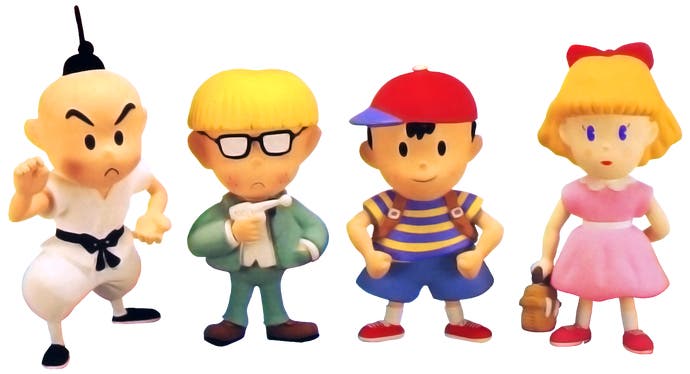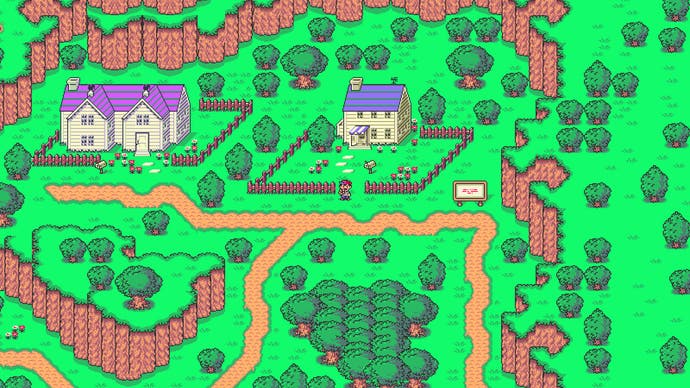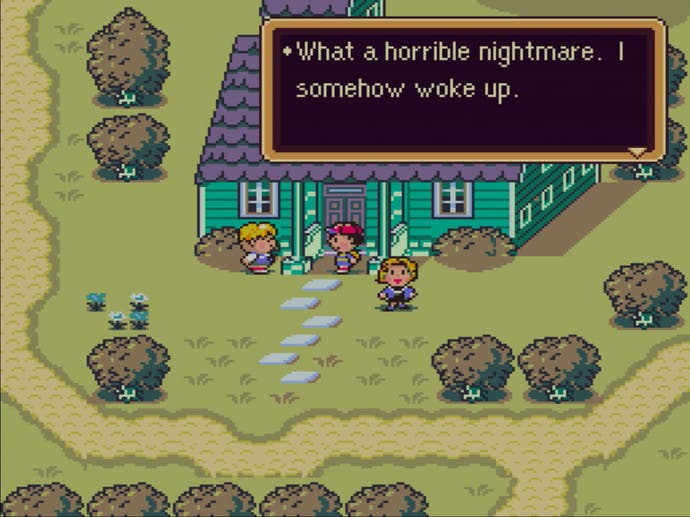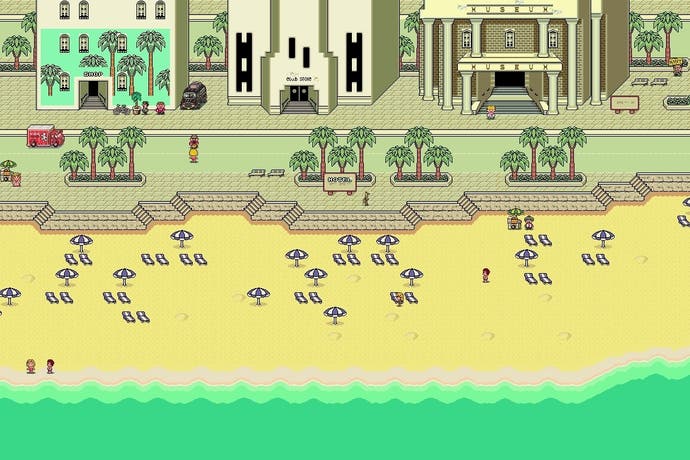Earthbound retrospective
Mother lode.
Shigesato Itoi cried, so the story goes, on the way home from his first meeting with Shigeru Miyamoto, after Nintendo's most famous game designer had rejected Itoi's idea for a video game. At the time, Itoi was famous across Japan or his work as a slogan writer, the Nipponese Don Draper. In 1981 he co-authored a collection of short stories with the country's most successful contemporary novelist, Haruki Murakami, while his 1983 slogan for a Woody Allen-fronted advertising campaign for the Seibu Department store remains one of the Japanese advertising industry's best known. As well as providing voice acting for the seminal Studio Ghibli film, My Neighbour Totoro, Itoi wrote each of the movie studio's film taglines and even co-wrote songs with the Oscar-winning composer Ryuichi Sakamoto. For this kind of multi-disciplinarian creative force, the emergence of the video game medium presented a beguiling opportunity.
But it was Nintendo that first approached Itoi in 1987 to ask if he'd consider writing the advertising slogan for one of its games. He agreed on the condition he could pitch his own game idea to the company. Itoi's significant artistic achievements did not move Miyamoto, however, who dismissed him as just another celebrity with a commercial interest in games, not an artistic one. Reportedly, when Nintendo's CEO Hiroshi Yamauchi heard how Itoi - whom he considered a genius - had been slighted, he instructed a reproached Miyamoto to call the prospective designer back to tell him that his game idea had been green-lit.

Itoi, uninterested in the knights, castles and dragons of the Japanese RPGs of the time, wanted to create a game set in a small American town, filled with contemporary props, cultural references and a quest revolving around the recovery of a series of scattered melodies. Itoi, who had grown up forbidden from seeing his divorced mother named the game - released for the Famicom in 1989 - simply 'Mother'.
Propelled by its celebrity writer and the subversive theme, Mother sold close to half a million copies in Japan. Work began on a sequel the following year, Itoi's team now working alongside Kirby creators HAL Laboratory. When the game was beset by development difficulties HAL sent one of its top developers to bring the project back on track, none other than current Nintendo president, Satoro Iwata. After four years of development, Mother 2 launched in Japan and, a year later, in America under the name Earthbound where it was accompanied by the slogan 'This Game Stinks' and bundled with a pack of scratch n' sniff cards.
This backstory is useful because it explains the unique circumstances of Earthbound's conception, the unusual ambitions and interests of its creators and the extraordinary pedigree behind the pixels. The story is relatively unknown in Europe, where Earthbound has never been released. Until now, that is, when almost twenty years after its original release it debuts as a digital download.

As with other Japanese RPGs - indeed, other fairy tales - Earthbound is a game about a young man leaving the village. Both figuratively, as he topples over the precipice of puberty towards manhood, and literally, as he leaves the home cooking and ready-made bed provided at his mother's house (your character's father is a detached presence throughout the game, available only through a telephone line, through which he offers snippets of advice, saves your progress and updates you on how much money you have accrued in your bank account) to make his way into the world.
Unlike all other Japanese RPGs of the time and most Japanese RPGs of today, Earthbound's theme and setting is contemporary. Its towns are populated by street gangs and middle-aged housewives with thickening thighs, and lined with amusement arcades, grocery stores, pristine lawns and police stations. Money earned from battling the game's smorgasbord of foes - from fighty pets to members of the Klu Klux Klan - is sent directly to your bank account and must be withdrawn from an ATM in a hotel lobby before you can buy health replenishing cookies and hamburgers. Your character, named Ness, wields a baseball bat for a weapon, and his armour is a brimmed cap. The setting grounds Earthbound's occasional philosophising in a familiar, almost mundane context, lending it surreal weight and highlighting the truths it strikes.
These props are brought to life by Itoi's whimsical yet powerful script. The game is filled with characters who have no functional purpose within the game; they exist to furnish the illusion that this is a living game world and to deliver Itoi's sometimes subversive, sometimes affecting dialogue. The game is rife with humour, from smarting one-liners to situational comedy that pokes fun not only at video game tropes but also the paradoxes of modern American living.

Beneath the humour there's melancholy, though. This is a game about the loss of adolescence, of innocence. "Being weird or goofy isn't my only aim," said Itoi later, of his approach to script writing in the game. "More than anything I have this strong desire to make people feel distraught. I want to give them laughter and joy too, of course, but I've always filled with the desire to make people feel ever-so slightly heartbroken."
Beneath the theme, the Dragon Quest template has been smoothed and improved. There are no random battles (an anomaly in a Japanese RPG of the time); rather you can view enemies in the environment and choose whether or not you want to engage with them. Lower level foes will even flee from your character and, if you chase them down, you'll simply earn the experience points and money without having to do battle. If an enemy successfully attacks you have a few seconds, as your HP counter ticks down, to select a healing spell or a restorative item, a smart design that's rarely been copied.
With its colourful palette, simplistic approachable sprite art and endlessly rich and inventive soundtrack (the game was one of the first to employ samples) Earthbound represents a singular vision and occupies its own space on the video game landscape, one without squatting copycats or neighbours. Despite a reported $2 million advertising campaign in the US, the original game sold only 150,000 copies outside of Japan (accounting for its stratospheric cost on the second hand market today), its unusual approach and routine theme alienating an audience interested only in the supposed maturity of fantasy. Today, the childlike graphics might put off a new generation of game players, but there are, one hopes, enough who are interested in restless creativity, idiosyncrasy and vision to make Earthbound a latter day success.
Regardless of sales, Itoi has the almost unique distinction of proving Shigeru Miyamoto wrong: in Earthbound his interest is shown to be entirely in the artistic value of video games, not the commercial value.

